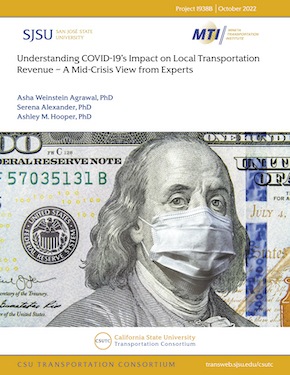- 408-924-7560
- mineta-institute@sjsu.edu
- Donate
Understanding COVID-19’s Impact on Local Transportation Revenue - A Mid-Crisis View from Experts
When COVID-19 swept into the United States in early 2020, it upended two patterns of behavior critical to transportation funding: how people traveled and where economic activity occurred. This study explored how, one year into the pandemic, experts in California believed that the COVID-19 pandemic was impacting local transportation budgets. We interviewed 34 funding experts who represented local transportation and public works departments, state officials, and municipal finance experts. In these conversations, conducted from December 2020 to March 2021, we asked interviewees how they saw COVID-19 impacting their overall local transportation budgets in the short and long term as well as which specific revenue sources were particularly effected. Key findings were as follows: the transportation revenue impacts from COVID-19 varied greatly by place, mode, and type of local government; public transit was the mode that experienced the most drastic change in transportation revenues; federal coronavirus relief funds allowed essential services to continue through the pandemic; the shift to telework had an enormous impact on transportation budgets by changing the location of taxable activities and thus reallocating revenue differently across local jurisdictions; and COVID-19 spotlighted long-term challenges with both motor fuel taxes and the distribution of sales tax from online purchases.
ASHA WEINSTEIN AGRAWAL, PHD
Dr. Agrawal is Director of the MTI National Transportation Finance Center and also Professor of Urban and Regional Planning at San José State University. Her research and teaching interests in transportation policy and planning include transportation finance, bicycle and pedestrian planning, travel survey methods, and transportation history.
SERENA E. ALEXANDER, PHD
Dr. Alexander is Associate Professor of Urban and Regional Planning and Director of Urban Online at San José State University. Her research predominantly focuses on developing and implementing cutting-edge strategies to address climate change and climate justice.
ASHLEY M. HOOPER, PHD
Dr. Hooper is an Urban Community Resiliency Advisor with the University of California Division of Agriculture and Natural Resources. Her research and extension programming focus on advancing dimensions of social-ecological resilience (e.g., access to food, transportation, green space) and sustainable economic development in communities within Los Angeles County and across California.
-
Contact Us
San José State University One Washington Square, San Jose, CA 95192 Phone: 408-924-7560 Email: mineta-institute@sjsu.edu






